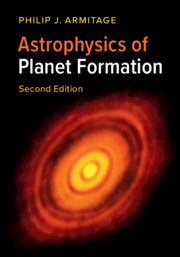Book contents
- Frontmatter
- Contents
- Preface
- 1 Observations of Planetary Systems
- 2 Protoplanetary Disk Structure
- 3 Protoplanetary Disk Evolution
- 4 Planetesimal Formation
- 5 Terrestrial Planet Formation
- 6 Giant Planet Formation
- 7 Early Evolution of Planetary Systems
- Appendix A Physical and Astronomical Constants
- Appendix B The Two-Body Problem
- Appendix C N-Body Methods
- References
- Index
7 - Early Evolution of Planetary Systems
Published online by Cambridge University Press: 27 January 2020
- Frontmatter
- Contents
- Preface
- 1 Observations of Planetary Systems
- 2 Protoplanetary Disk Structure
- 3 Protoplanetary Disk Evolution
- 4 Planetesimal Formation
- 5 Terrestrial Planet Formation
- 6 Giant Planet Formation
- 7 Early Evolution of Planetary Systems
- Appendix A Physical and Astronomical Constants
- Appendix B The Two-Body Problem
- Appendix C N-Body Methods
- References
- Index
Summary
Chapter 7 covers processes that lead to the evolution of planetary systems. Planetary migration in gaseous disks is described, starting with an elementary derivation of the torque in the impulse approximation and continuing with a discussion of the physics of Lindblad and co-rotation torques. Type I and Type 2 planetary migration, gap opening, and eccentricity evolution are described. The regimes of secular and resonant dynamics are defined, together with an intuitive physical description of mean-motion resonance. Resonant capture, Kozai-Lidov dynamics, and planetesimal disk migration are discussed. The concept of Hill stability is introduced and derived, and the outcome of planetary system instability leading to planet-planet scattering is reviewed. The Nice model and the Grand Tack model for the early evolution of the Solar System are discussed. The size distribution resulting from a steady-state collisional cascade is derived, and stellar and white dwarf debris disk evolution described.
Information
- Type
- Chapter
- Information
- Astrophysics of Planet Formation , pp. 247 - 300Publisher: Cambridge University PressPrint publication year: 2020
Accessibility standard: Unknown
Why this information is here
This section outlines the accessibility features of this content - including support for screen readers, full keyboard navigation and high-contrast display options. This may not be relevant for you.Accessibility Information
- 1
- Cited by
